I predicted at "Kastelorizo - Mediterranean Flashpoint?" that the issue of a Greek exclusive economic zone would turn the tiny island off the Anatolian coast into a crisis point. This blog notes some developments on the EEZ topic that bear on that issue.
 A view of the Kastelorizo town with Turkey visible in the distance. |
FYI, the island maintains a website in Greek and English: https://www.kastellorizo.online.
For starters, the Hellas Frappe blog reports on a indirect Greek proclamation of its EEZ, at the behest of Foreign Minister Dimitris Avramopoulos. This was done via a verbal statement of its continental shelf coordinates to Secretary-General Ban Ki-moon of the United Nations. The Hellas Frappe story on this move includes the map below, which closely resembles the upper one of the pair posted at the main article. (February 21, 2013)
 Kastelorizo features prominently in this map of the purported Greek EEZ claim. |
Mar. 14, 2013 update: The Greek government has devised the idea of a "European Exclusive Economic Zone" or EEEZ as a way to spread the risk vis-à-vis Turkey to the rest of the European Union. Clever, but will it work?
Sep. 6, 2013 update: The July 3 coup d'état in Egypt, followed by the Turkish government's ferocious support for the ousted Morsi government has led to a rapid decline in hitherto warm Turkish-Egyptian relations which has transformed the eastern Mediterranean sea map. ANSAmed reports that Cairo now spurns Ankara in favor of Athens:
Greek Foreign Minister Evangelos Venizelos and his Egyptian counterpart Nabil Fahmy Thursday agreed to create a bilateral committee aimed at delineating the two countries' maritime zones despite possible objections by "third countries" and pointed to the prospect of a three-way cooperation with Cyprus. Speaking after talks with Venizelos in Cairo, as daily Kathimerini reports, Fahmy stressed that "each country has its own interests and it does not concern us if third countries are bothered by this," apparently referring to Turkey, which has expressed its objections to the prospects of Greece unilaterally declaring an exclusive economic zone (EEZ). Venizelos was slightly more diplomatic in tone, saying the initiative would be undertaken for the benefit of both Greece and Egypt and "with no hostile disposition toward any other country." Experts from Greece, Egypt and Cyprus are to meet soon to seek common criteria for a three-way initiative, sources said.
Oct. 18, 2015 update: It's a feel-good story about Israelis sailing on vacation who save Syrians in desperate straits, followed by intense gratitude ("When we told them we were Jews from Israel, they kissed us"). But the fact that this took place in the midst of a huge movement of Syrians to Europe and in the 1-2 mile passageway between Anatolia and Kastelorizo raises questions: What were Syrians doing there? Does this presage a larger movement, directed by Ankara of Syrians to Kastelorizo?
Oct. 12, 2016 update: Ankara has raised claims to Kastelorizo. It called on Athens not to proceed with scheduled military exercises near the island, then, according to Greek Reporter,
issued two NOTAM [Notice to Airmen] with which they call on Athens to cancel the planned exercises in the sea area west of Kastellorizo, and at the same time note that the island belongs in the Turkish search and rescue area of the Aegean Sea.Specifically, the Turkish NOTAM A4447 / 16, which refers to the corresponding Greek A2200 / 16 that says that in the western region of Kastellorizo there will be the SAR military exercise in the October 18-19 weekend, Turkey argues that Kastellorizo (MEIS in Turkish, as mentioned in the NOTAM) is a demilitarized zone, and should not be included in the exercises of the Greek Armed Forces.Moreover, on Tuesday Ankara issued NOTAM A4455 / 16 which states that the area in which the Greek Armed Forces exercise SAR (18-19 /10) is conducted, belongs to the Turkish Research and Rescue zone, calling, therefore, on Greek authorities to cooperate with Turkey on the issue.
July 13, 2017 update: I flew relatively near to Kastelorizo today (see the map at right). Hoping to get there someday.
Dec. 30, 2017 update: London's Daily Mail today published a travel piece on Kastelorizo that is completely innocent of the island's strategic or commercial importance. But it does sound like a nice place to visit.
Feb. 20, 2018 update: The leader of the parliamentary opposition in Turkey, Kemal Kılıçdaroğlu, has announced that if he becomes president, he will "invade and take over 18 Greek islands in the Aegean Sea, just as former Turkish PM Bulent Ecevit invaded Cyprus in 1974." Although Kastelorizo is far from the Aegean, presumably it is included in that threat. Additionally, Meral Akşener, head of the newly formed "Good Party" seemed to concur with Kılıçdaroğlu, tweeting that "what is required must be done."
Apr. 10, 2018 update: Greek soldiers fired warning shots at a Turkish helicopter after it approached the island of Ro, an uninhabited island just to the west of Kastelorizo. To add to the provocation, the helicopter buzzed the island at low altitude along the outer limit of the Turkish air control identification zone with its navigation lights turned off. The Daily Telegraph called the incident "a dangerous escalation of tension."
Apr. 17, 2018 update: The prime minister of Greece, Alexis Tsipras, flew to Kastelorizo to inaugurate two desalination plants, making a statement to the Turks about Greek sovereignty over the island. "Greece can defend its sovereign rights from one end of this country to the other. We won't negotiate, we won't bargain, we won't cede an inch of Kastelorizo land." He also told several islanders, "You are the guardians of Thermopylae." Turkish air traffic controllers responded as Tsipras left Kastelorizo by radioing his helicopter pilot to tell him the aircraft was flying in Turkish airspace.
 Prime Minister Alexis Tsipras on a visit to Kastellorizo in April 2018. |
Apr. 21, 2018 update: In a long New York Times analysis, "Tiny Islands Make for Big Tensions Between Greece and Turkey," Patrick Kingsley reviews the situation in Kastelorizo. He notes that Ankara "does not contest sovereignty. But the government feels it is unfair that Greece should have the right to potentially exploit energy resources in parts of the Mediterranean seabed that lie within sight of Turkey but many hundreds of miles from the Greek mainland." Comment: This sounds like a warm-up to Turkish claims to the Greek EEZ, parallel to those already being made on the Cypriot EEZ.
Jul. 5, 2018 update: I waved at Kastelorizo today from my Aegean Airlines flight on the way from Tel Aviv to Athens. Note that Kastelorizo is highlighted on this map; not a coincidence.
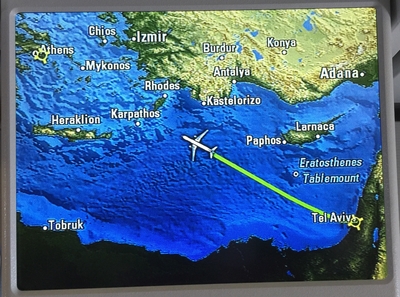
Nov. 14, 2018 update: iefimerida.gr has produced clearer maps showing the huge role of Kastelorizo in the delineation of eastern Mediterranean boundaries according to the Turkish view. Top includes the island, bottom excludes it; both are screen grabs.
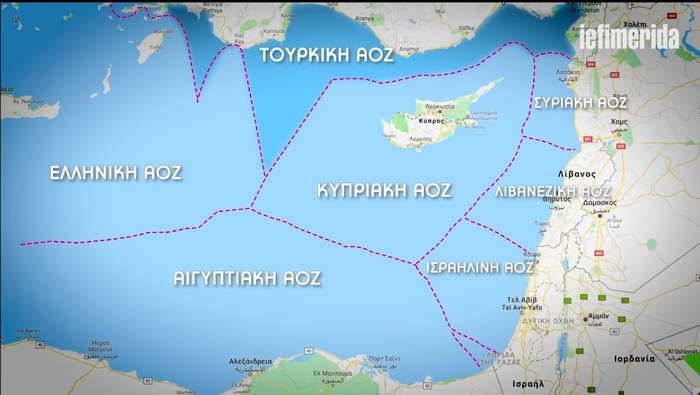 With Kastelorizo. |
 Without Kastelorizo. |
Mar. 21, 2019 update: Theodore C. Kariotis mentions Kastelorizo only once in "The Critical Role of the Exclusive Economic Zone in the Greek-Turkish Dispute" but the article provides helpful background information on its role. The map of the Greek EEZ makes clear the island's crucial role.

Jan. 14, 2019 update: Angelos Syrigos, an associate professor at Panteion University in Athens notes that
In 2012 Turkey formally laid claim to the northern section of the Eastern Mediterranean. It was the year that several maps depicting sea areas west of Cyprus and south of the eastern Aegean islands of Rhodes and Kastelorizo were published in the Turkish government gazette. ...
There has been no change since then. ... Greece went on to lodge the usual complaints with the United Nations, while issuing vague condemnations of Turkey's actions. Seven years have passed since then. Everyone knows what Turkey's exact claims are in the area. Greece has still not come up with a clear definition of what it considers the precise boundaries of its continental shelf in the Eastern Mediterranean. It merely protests Turkey's actions.
Things are now heating up.
In a directive to seafarers (navigational telex, or navtex) on January 3, Turkey announced that its research vessel Barbaros Hayreddin Pasa will conduct seismic surveys within a large chunk of the Greek continental shelf and the Cypriot EEZ in the Eastern Mediterranean.
These are the areas claimed by Turkey in 2012. Until now, the Barbaros used to conduct illegal surveys in parts of the Cypriot EEZ. It had for years stayed clear of the Kastelorizo and Rhodes continental shelves. This marks a shift in Turkish policy that must be taken note of. ... Furthermore, the sea area in question is officially claimed by Ankara.
In response, Syrigos urges that Greece develop a Turkey policy that focuses on two issues, one of which is that "Turkey will center its attention on the Kastelorizo area as it considers it to be the Achilles' heel of Greece's maritime claims."
Jun. 19, 2019 update: The Greek prime minister, Alexis Tsipras, stated that Greece will stop Turkey's drilling for natural gas inside the Greek EEZ east of Kastelorizo: "We won't allow Erdoğan to drill in Greece's EEZ. Greece has a prevention plan. Greece will not take a step back."
Jun. 23, 2019 update: Why are the Turks drilling off of Cyprus? It's a very aggressive act that can lead to tragedy. Charles Ellinas of the Atlantic Council speculates that
Turkey's position is that the area where it is drilling is part of its continental shelf and that it has sole rights to it. It does not see this as related to the Cyprus problem. Even though Turkey may be prepared to negotiate, it is more likely to be about EEZ rights related to two Greek islands off its coast, Kastellorizo and Stroggili, and the remainder of Cyprus' EEZ and the rights of Turkish Cypriots. ... If Turkey makes a discovery it will escalate the problems as it will probably plan to exploit it.
July 28, 2019 update: The Kastelorizo flashpoint I predicted in 2012 might be about to start.
The Turkish government has, based on its unique and self-interested understanding of the international law governing sea rights, sent three ships to explore for hydrocarbons in the exclusive economic zone (EEZ) of Cyprus; now, it has signaled an intention to do the same in Greek waters.
Specifically, the Turkish Petroleum Corporation (TPAO) has informed the Turkish Navy of plans to conduct seismic research in an area stretching from the south of Rhodes to beyond Kastelorizo starting sometime after August 15.
The new Greek government of Kyriakos Mitsotakis has responded with alarm: "Greece does not tolerate threats of war," announced Foreign Minister Nikos Dendias. Meantime, Athens is strengthening ties with Israel, which Dendias has just visited.
Nov. 27, 2019 update: The Turkish government signed an agreement with a Libyan faction determining their joint maritime boundary, titled the "Memorandum of Understanding Between Turkey and Libya on Delimitation of the Maritime Jurisdiction Areas in the Mediterranean." It's a wild document that ignores the maritime rights of Greek islands and completely ignores the existence of Kastelorizo. Trouble ahead.
 Ankara's idea of the Turkish-Libyan corridor that, among other problems, ignores the territorial rights of Greek islands. |
It is based on the Türkiye Mavi Vatan concept, as developed by its fabricator, Cihat Yayci, and draws a median line between the Turkish and the Greek mainlands, thereby turning many Greek islands into enclaves within Turkish waters and breaking the maritime contiguity between Greece and Cyprus.
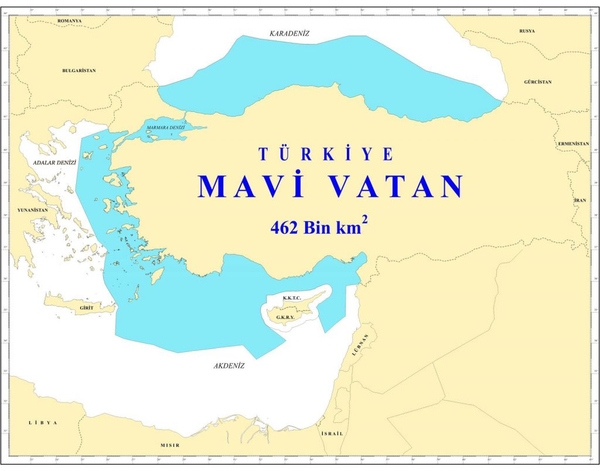 Türkiye Mavi Vatan. |
Dec. 5, 2019 update: Abdullah Bozkurt has published the complete text of the Turkey-Libya MoU.
Dec. 12, 2019 update: Predictably, a map of Turkey's sea boundaries in the Mediterranean Sea completely ignores the existence of Kastelorizo.
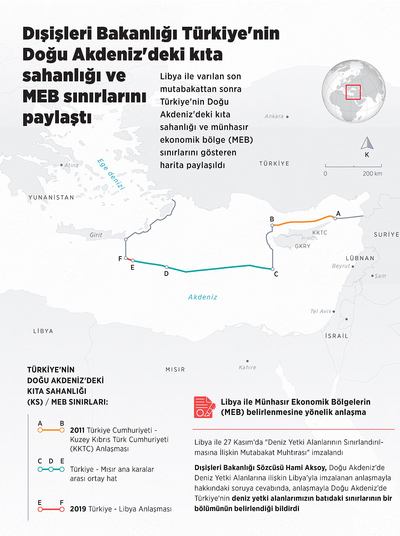
Dec. 17, 2019 update: In the aftermath of the Turkey-Libya agreement on Nov. 28 to create an exclusive economic zone that ignores the claims of other states, and Greece in particular, Erdoğan has now confirmed the signals I noted on July 28, 2019, that Turkish interests will begin exploring for natural gas reserves in Greek waters. From Ekathimerini:
Fueling what is already a highly charged atmosphere, Turkish President Recep Tayyip Erdogan has announced exploration and drilling activities in areas of the Eastern Mediterranean that are designated in the maritime border accord signed between Turkey and Libya, and which violate Greek sovereignty.
"With the help of God and very soon here we will begin seismic surveys and drilling," Erdogan said, pointing to an area south of Kastellorizo and east of Crete, during a Sunday appearance on Turkey's A Haber TV.
Dec. 27, 2019 update: In a newly aggressive spirit, Turkey's military is regularly overflying and engaging in naval exercises in Kastelorizo's sovereign space. Where is this leading?
Jan. 2, 2020 update: In the context of its agreement with the Tripoli authority in Libya and the signing of the EastMed agreement, Turkey's government has announced plans to drill for oil and gas in the territorial waters south of Kastelorizo (and also south of Crete).
Comment: This is potentially a very major development, in which Erdoğan directly challenges Greek sovereignty.
Jan. 9, 2020 update: Çağatay Erciyes, the director general of Turkey Ministry of Foreign Affairs tweeted today about Kastelorizo: "It is ridiculous to think that a small island of 10km2, which is 2km away from Turkey and 570km from Greece, can create a 40,000 km2 area of maritime jurisdiction in the Mediterranean Sea."
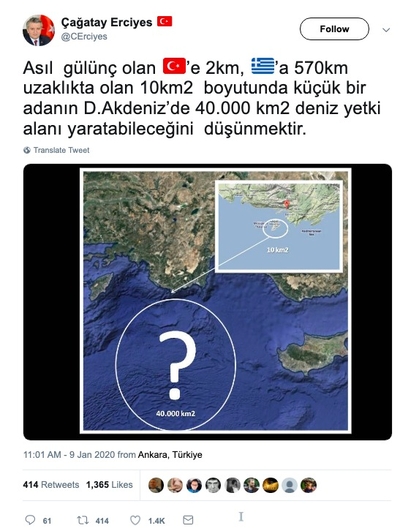
Jan. 10, 2020 update: As the Greek chief of staff visited Kastelorizo, the Turkish air force engaged in 18 overflights of the island.
Jan. 30, 2020 update: The Greek and Turkish navies have both issued NAVTEX warnings about their plans to engage in exercises tomorrow in the area south of Kastelorizo.
Feb. 6, 2020 update: The Turkish government has announced definite plans to explore for gas and oil in the Mediterranean Sea south on Kastelorizo, i.e., in the Greek EEZ.
Feb. 17, 2020 update: Mention of refugees reaching Kastelorizo raises the prospect of the Turkish regime overwhelming the island's 425 inhabitants with thousands of illegal migrants to make life there intolerable. Comment: I would not put this scheme past Erdoğan.
Feb. 19, 2020 update: I Kathimerini reports that the Turkish coast guard is escorting illegal migrants to Kastelorizo.
Mar. 11, 2020 update: Burak Bedkil provides an overview of current issues in "Kastellorizo: Tiny Island, Colossal Dispute."
July 15, 2020 update: Jack Dulgarian plays out a scenario of Erdoğan's Turkey seizing Kastelorizo: It starts with Erdoğan needing a boost in advance of the 2023 presidential elections, so his forces take Kastelorizo without a shot and the Western powers acquiesce to the fait accompli (think Hong Kong). Dulgarian suggests that the Greeks prepare for this threat by purchasing some arms and changing relations with Washington.
Comment: The prospect of a successful Turkish invasion is convincing. The proposed Greek steps less so.
July 21, 2020 update: The Turkish navy has warned today that its ships will immediately start exploring for gas and oil near Kastelorizo. Or, in the more precise formulation of the Greek newspaper Ekathimerini:
The Antalya Navtex station on Tuesday announced plans for a Turkish seismic survey south and east of the Greek island of Kastellorizo from July 21-August 2.
Ten warships left the Aksaz naval base not far from Kastelorizo. Turkish war planes repeatedly buzzed Kastelorizo.
The Greek foreign ministry issued a statement calling on Turkey "to immediately cease these illegal actions which violate our sovereign rights and undermine peace and security in the area." Greek armed forces went on alert.
Comment: It appears Erdoğan is opening two new fronts, this one and the Armenian one, maybe followed by a Yemeni one.
July 23, 2020 update: Turkish media, which long ignored Kastelorizo, are possibly softening public opinion for action against the island by providing general information about it and featuring a Greek professor who believes it rightfully belongs to Turkey.
July 27, 2020 update: A Greek source reports that Athens issues a NAVTEX (naval warning) for a live fire-naval exercise from today until July 30 in an area around Kastelorizo; but the government denies it.
Aug. 2, 2020 update: It's close to routine for Turkish warplanes to buzz Kastelorizo for 3-5 minutes. Continuing for 2½ hours is another story, but that's what just happened.
Aug. 3, 2020 update: For a Turkish analysis of the technicalities surrounding Kastelorizo, see Tevfik Kadan, "The End of Seville: the Turkish Tradition of Tearing up Maps." (The title refers to the European Union's having commissioned the University of Seville to study the issue and it came up with an interpretation highly favorable to Greece.)
Comment: I note that each side points to an inconsistency on the other: Turks note that Greece did not insist on the Ionian Islands being included in its boundary delimitation with Italy. Greeks note that Turkey insists on its UNCLOS-approved EEZ in the Black Sea.
Aug. 6, 2020 update: For another Turkish analysis, see "Meis Island's Status According to UN Law of the Sea Convention" by Irfan Kaya Ulger.
Aug. 11, 2020 update: After a brief pause, Ankara has resumed plans to search for oil and gas in the Greek EEZ south of Kastelorizo with the seismic survey vessel Oruç Reis, along with two support research vessels and several Turkish warships.
In response, Neos Kosmos reports, Greek warships "are sailing near the area with a message being transmitted at a constant 15-minute interval to the captain of the Oruç Reis vessel to inform both the captain and crew that they have entered the Greek continental shelf and urging them to leave the area. Greek government sources say that the noise in the area due to the large concentration of warships would not allow the Oruc Reis to carry out work."
As the Turkish public hears more about Kastelorizo, Haberler.com, a major news website, today published information about the island.
Aug. 17, 2020 update: A mini naval confrontation took place in Kastelorizo's EEZ; read here for the details.
Aug. 29, 2020 update: Agence France-Presse reports that Greek soldiers make up half the population of Kastelorizo, that the ferry service connecting the island to Turkey functions as ever, and that the locals dismiss international tensions with an airy, "It's been the same thing ever since I was born. Tomorrow the Turks are going to invade the island!" Meanwhile, photographs by Louisa Gouliamaki indicate that additional soldiers are reaching the island by commercial ferry, complete with heavy equipment.
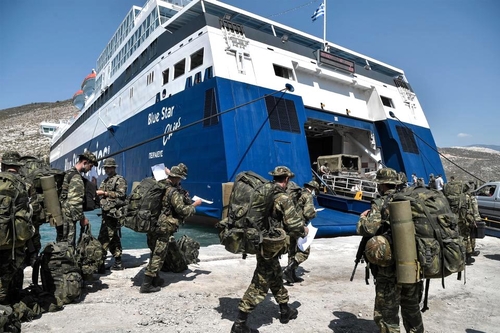 Greek soldiers going by commercial ferry to Kastelorizo. |
Aug. 30, 2020 update: Turkey's Ministry of Foreign Affairs responded to the news of Greek soldiers reaching the island with: "We reject the illegitimate attempts of changes on the status of the Island. We also underline that Turkey will not allow that such a provocation immediately across her coasts to attain its goal." The commentator Yusuf Erim adds that "Turkey needs to very sternly order Greece to demilitarize the island of Kastellorizo immediately, if this call is not answered the Turkish Armed Forces should enforce previous international treaties and remove Greek military units from the island via an intervention."
Turkey needs to very sternly order Greece to demilitarize the island of Kastellorizo immediately, if this call is not answered the Turkish Armed Forces should enforce previous international treaties and remove Greek military units from the island via an intervention. https://t.co/l0laUmllFf
— Yusuf Erim (@YusufErim34) August 30, 2020
Aug. 31, 2020 update: Turkey's Erdoğan referred to Kastelorizo's sea rights without mentioning it by name. He condemned "the plans of those who try to confine a country of 780,000 square kilometers to its shores using an island of 10 square kilometers." He went on, referring to the 1923 Treaty of Lausanne and other agreements that delineated the borders of Turkey: "They will understand Turkey has the political, economic and military power to tear up immoral maps and documents imposed on itself." Then, alluding to military victories over the Greeks, he added: "Either they will understand this with the language of politics and diplomacy or through painful experiences on the battlefield. A century ago, we either buried them in the ground or threw them into the sea. I hope they do not pay the same price now."
Sep. 1, 2020 update: Sabah quotes various Turkish experts saying that the arrival of soldiers on Kastelorizo undermines the Greek legal claim to the island, for various treaties require that it be permanently demilitarized.
Sep. 2, 2020 update: Hürriyet introduces its readers to Kastelorizo by emphasizing its close ties with the Turkish town closest to it in Anatolia, Kaş. It notes they are sister cities, the shopping sprees by islanders in Kaş, that half the island residents speak Turkish, the presence of a mosque there, and so on. Reading it gives the impression that Kastelorizo must return to its motherland.
Sep. 13, 2020 update: Greek President Katerina Sakellaropoulou visited Kastelorizo, where she made conciliatory remarks: "We are going through a difficult and dangerous period. The Turkish leadership is intensifying the pressure on our country, leading to aggressive statements" which undermine "the good neighborly relations and peaceful coexistence that have been built over so many decades by Greeks and Turks, who view the sea that separates them not as an impenetrable border, but as a channel of communication."
Sep. 16, 2020 updates: (1) A Deutsche Welle report puts the inhabitants of Kastelorizo at a mere 150, one third the usual census. It also emphasizes the good human relations between the Greek islanders and their Turkish mainland counterparts at Kaş, telling the story of the unique binational married couple straddling the divide.
(2) I look at the current tensions and what they signify today at "Will Turkey and Greece Clash over a Tiny Island?"
Sep. 20, 2020 update: The pro-Erdoğan Daily Sabah published an article by Dilara Aslan whose thesis is summed up in the title: "Greece militarizing Aegean islands close to Turkey's mainland poses national security threat." According to Aslan, the 18 of 23 Greek islands, including Kastelorizo, that by treaty must be demilitarized are in fact "heavily militarized," thus posing the threat to Turkey alluded to in the title.
One former Turkish rear admiral comments that "Greece is illegally militarizing these islands under the pretext of a 'Turkish threat'." Another retired rear admiral notes, "Greece continuously violated the status of non-militarization, which must be considered as a direct threat to Turkish security," adding: "they are deploying F-16s, guided-missile fast attack craft, and they are supplying their submarines. Their military aircraft can also utilize the islands for takeoffs and landings."
Comment: It sounds like the Turkish regime is preparing public opinion for a possible attack on Greek islands.
Sep. 23, 2020 update: George N. Tzogopoulos writes in "The Dangerous Waters of the Mediterranean":
the explorations of the Oruç Reis have not violated areas marked in the Greek-Egyptian accord—but its explorations south of Kastelorizo challenge the traditional Greek position shaped by international law that stipulates that islands have a right to an EEZ and a continental shelf. Turkey disagrees and is advocating for a delimitation based on equity. In so doing, it is provoking Greece in order to predispose the international community to accept its argument.
Oct. 12, 2020 update: All the political attention has spurred feature articles on the island, such as "Kastellorizo: A tiny, magical island with a huge history" by Antonia Komarkowski.
Oct. 20, 2020 update: An account by Nicholas Pappas on the Kastelorizo diaspora estimates that some 80,000 Australian "Kazzies" trace their roots in part to the minuscule island.
Oct. 30, 2020 update: Margarita Pournara offers another mood-piece about in "On a Rock in a Hard Place: Summer 2020 on Kastellorizo." Nicholas Pappas looks at some history and the Australia connection at "A Tale of Cultural Endurance, from Kastellorizo to Australia and Back."
Mar. 15, 2021 update: The governments of Cyprus, Greece, and Israel on Mar. 9 signed an agreement to build the 1,200-kilometer (745-mile) EuroAsia Interconnector, an electricity cable (the world's longest) extending from Israel to Greece through Cypriot waters. Today, the government of Turkey sent a démarche to the governments of Greece and Israel (not Cyprus, which it chooses not to recognize), noting that the cable is planned to go through Turkish waters and demanding they ask permission. As the Turkish state media explained, "Turkish officials argue that with its long Mediterranean coastline, Ankara has a greater right to the waters in the region than Greece."
Comment: This looks like the possible beginning of a struggle over Kastelorizo's rights.
Sep. 28, 2021 update: Gen. Konstantinos Floros, the chief of the Hellenic National Defense General Staff, wrote on Facebook: "The PAPANIKOLIS submarine emerged majestically outside the port of Megisti in Kastelorizo, creating a sense of total security for the inhabitants of our border island while outwitting the agonized efforts of those who attempt to locate it. Our Submarines remain the 'unseen' Aegean guards, with their periscopes watching everything!!!"
 The Papanikolis submarine outside the port of Megisti in Kastelorizo. |
Dec. 5, 2021 update: So fraught is life on Kastelorizo that even the formation of a football (i.e, soccer) team on the island is portrayed in terms of national security. From the Greek City Times: "The association was founded mainly for national reasons," said the secretary of the club's board, Michalis Loizos.
Jan. 3, 2022 update: A Turkish military video shows 12 naval academy students, including one female, swimming the distance of 1,950 meters that separates Kastelorizo from Turkey, then emerging from the water with "My homeland, I would sacrifice my life for you."
 The naval academy students. |
Feb. 8, 2022 update: Al Jazeera reports that the Turkish authorities conducted a comprehensive sounding of the seafloor between Crete and Kastellorizo in mid-2020.
June 15, 2022 update: Hay Eytan Cohen Yanarocak provides a review of recent developments in "Turkey's 'Precious Loneliness' vs. Greece's Multilateralism" (footnotes omitted):
Along with the other Greek islands, Kastellorizo's strategic position in the Eastern Mediterranean constitutes the most important disagreement between Turkey and Greece. Thanks to this tiny island's existence, Greece can claim that its territorial waters extend nearly to the Turkish mainland. On the other hand, Turkey claims territorial waters based on its 1,577 km-long shore in the Eastern Mediterranean – the longest in the region.
Due to Greek security concerns regarding Kastellorizo, which sits only 1.5 km away from the Turkish shores and 600 km away from Greece's mainland, Greece deployed its soldiers to the island. It was supposed to remain de-militarized according to the basic interpretation of Article 14 of the 1947 Paris Peace Treaty. Seeing this deployment as a hostile act, Turkish Defense Minister Hulusi Akar decided to escalate the situation even further in December 2021 when he implied that the Turkish soldiers are capable of conducting an amphibious attack against Kastellorizo. This only served to justify Athens' controversial decision. Recently, on June 7, Turkish foreign minister Mevlüt Çavuşoğlu questioned Greece's sovereignty over the militarized islands of the Aegean Sea and Eastern Mediterranean.
Sep. 16, 2024 update: Greek Defense Minister Nikos Dendias visited Kastelorizo on the occasion of the 81st anniversary of its liberation from the Italians, surrounded by Land Forces Commander Lieutenant General Georgios Kostidis and an entourage of soldiers. Turkish media quoted him stating:
Kastelorizo is the focal point of our country's Exclusive Economic Zone (EEZ) and continental shelf. Any attempt to separate it from the Dodecanese Islands due to its proximity to the Turkish coast is a false and self-refuting claim. Article 121, paragraph 2 of the [EEZ] Convention stipulates that islands have the right to a coastal zone, a contiguous zone, an Exclusive Economic Zone and a continental shelf. No distinction is made based on the size of the islands. Views contrary to what is clearly stated above are unacceptable.
Greece, under its current constitution, must defend the rights of our motherland, as determined by the International Law of the Sea. Therefore, this anniversary has a special significance. We live in a period when freedom and independence are threatened by authoritarianism and revisionism. But freedom is not something given. We must protect it with its price, labor, unity and historical memory.
Oct. 22, 2024 update: A Greek travel website urges Greeks to make the trek out to Kastelorizo.
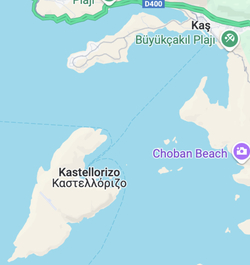 July 3, 2025 update: Good to learn that the 19th annual swimming race between Kastelorizo and Kas, a town in Türkiye, has been held. Although held as part of the closing ceremony of a festival organized by the Kas Municipality, a Greek national, Fotis Diakodimitris, won the competition this year. A Greek article about the swim meet helpfully adds that the Kas port is "where the Turkish commandos would swim to reach Kastelorizo and occupy it," according accounts in the Turkish media.
July 3, 2025 update: Good to learn that the 19th annual swimming race between Kastelorizo and Kas, a town in Türkiye, has been held. Although held as part of the closing ceremony of a festival organized by the Kas Municipality, a Greek national, Fotis Diakodimitris, won the competition this year. A Greek article about the swim meet helpfully adds that the Kas port is "where the Turkish commandos would swim to reach Kastelorizo and occupy it," according accounts in the Turkish media.
